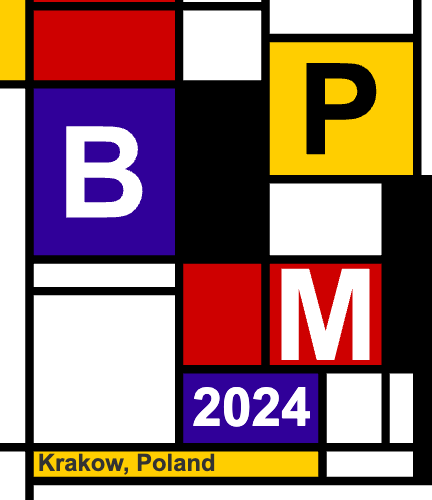RPA Forum Chairs
- Simone Agostinelli, Sapienza Università di Roma, Italy
- Daniel Amyot, University of Ottawa, Canada
- Henrik Leopold, Kühne Logistics University / Hasso Plattner Institute, University of Potsdam, Germany
Important Dates
- Abstract submission: TUE
21 May 202428 May 2024 (optional) - Paper submission: TUE
28 May 20244 June 2024 - Author notification: THU 27 June 2024
- Camera-ready submission: FRI 5 July 2024
- Conference / RPA Forum: 3-5 September 2024
Call for Robotic Process Automation (RPA) Forum papers
Robotic Process Automation (RPA) is a maturing technology in the field of Business Process Management (BPM). RPA allows organizations to automate high-volume and repetitive tasks – also referred to as routines – performed by human users. The enactment of these routines is emulated by means of a software robot that works on the applications’ user interfaces (UIs) in the same way as the original human operators did. Examples of those routine tasks include data transfer between applications, automated email query processing, and collation of payroll data from different sources.
However, RPA is much more than just technological innovation. It enables a digital task force and, what is more important, a control mechanism over it. Its objectives also extend beyond cutting costs: RPA directly addresses the digital transformation of companies by creating new value, improving the quality of services and products, reducing and controlling execution times, and improving work satisfaction by liberating employees from repetitive and tedious tasks.
At this point in time, RPA has reached a certain level of technological maturity and organizational adoption. This means researchers now have the opportunity to examine RPA from a broader perspective, encompassing three distinct viewpoints:
- Low-code automation: RPA is part of a development towards low-code automation aimed at building and automating processes with off-the-shelf software solutions that do not require extensive programming skills.
- RPA for smart automation: RPA can be combined with other technologies, such as process mining, OCR, or chatbots, with the goal of a more flexible, holistic process automation.
- AI-empowered RPA: a new level of automation targeted to inject AI, ML or LLM capabilities to identify routine tasks from multiple session recordings that are suitable for automation. This goes beyond conventional rule-based approaches, allowing for a more intelligent and adaptable automation strategy.
The capabilities and opportunities of RPA challenge a broad set of research communities. Computer scientists are attracted to its various technical aspects. Economists study the impact of RPA on labor and organizational effectiveness. Engineers are enabled to connect different data sources, improve the quality of the data, and accelerate data analysis. RPA is particularly interesting for information systems scholars because it constitutes a technological innovation that impacts how individuals interact with software, contributes to the digital transformation of organizations, and has social implications since it may reduce work opportunities for those people who are carrying out simple, manual work.
This forum aims to bring together researchers from various communities and disciplines to discuss challenges, opportunities, and new ideas that relate to RPA and its application to business processes in private and public sectors. It is a unique setting where technical, business-oriented, and human-centered perspectives will come together.
Topics
The forum solicits contributions related to RPA including, but not limited to, the following topics:
- Management of RPA and process automation in general, e.g., organizational expectations on RPA, RPA and digital transformation/innovation, and organizational/social impact of RPA;
- Technology for RPA-powered process automation, e.g., technological advances such as AI in combination with RPA, novel paradigms for employing RPA, RPA architectures and platforms;
- Application of RPA-powered process automation, e.g., use cases or case studies in various industries or business functions.
Paper submission
Prospective authors are invited to submit original, unpublished papers on any of the forum’s topics. Papers must be written in English and must not simultaneously be submitted to another journal, conference, or workshop. We invite papers that (i) focus on technical aspects, (ii) describe new research positions or approaches (exploratory papers), or (iii) focus on evaluating existing problem situations (experience papers). The maximum length of the paper is 15 pages (including the title page, references, appendices, etc.). Shorter papers are explicitly welcomed.
Submissions must be prepared according to the format of Lecture Notes in Business Information Processing (LNBIP) specified by Springer. The title page must contain a short abstract and a list of keywords.
Papers must be submitted electronically in PDF format via the BPM 2024 EasyChair submission site by selecting “BPM 2024 Robotic Process Automation Forum”. To facilitate a quick review process, authors are kindly asked to submit their (preliminary) abstract a week earlier.
Program Committee
Aleksandre Asatiani, University of Gothenburg, Sweden
Bernhard Axmann, Technical University of Ingolstadt, Germany
Adela del Río-Ortega, University of Seville, Spain
José González Enríquez, University of Seville, Spain
Peter Fettke, German Research Center for Artificial Intelligence (DFKI), and Saarland University, Germany
Hannu Jaakkola, University of Tampere, Finland
Christian Janiesch, TU Dortmund University, Germany
Andrés Jiménez Ramírez, University of Seville, Spain
Abderrahmane Leshob, The Université du Québec à Montréal (UQAM), Canada
Fabrizio Maria Maggi, University of Bolzano, Italy
Andrea Marrella, Sapienza University of Rome, Italy
Massimo Mecella, Sapienza University of Rome, Italy
Dan O’Leary, University of Southern California, USA
Teijo Peltoniemi, University of Turku, Finland
Petr Průcha, Technical University of Liberec, Czech Republic
Jana-Rebecca Rehse, Universität Mannheim, Germany
Yara Rizk, IBM Research, USA
Rehan Syed, Queensland University of Technology, Australia
Lucineia Heloisa Thom, Federal University of Rio Grande do Sul, Brasil
Inge van de Weerd, Utrecht University, The Netherlands
Maximilian Völker, Hasso Plattner Institut, Germany
Moe Wynn, Queensland University of Technology, Australia
